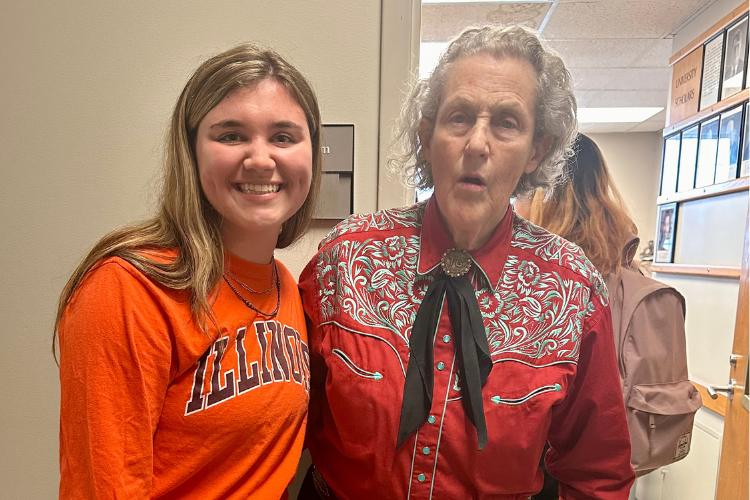Drawing inspiration: Temple Grandin’s unique perspectives and innovations in animal science

Imagine you are walking in a big city with a lot of people. There’s cars honking, people yelling, trash all over the streets, construction sites, and your Google Maps just took you in the wrong direction. You would probably be stressed out, right? Now think of this scenario from cattle or pigs’ perspectives when they are being transported to different locations, or corralled. There’s chains hanging from the gates, shadows, workers yelling and poking you, you may be trying to walk on a slick floor, and you don’t know where you are going, or why. In this situation, animals stress out and can ultimately be less productive as a result. However, because of Dr. Temple Grandin, there is a solution to this problem.
Dr. Grandin, a College of ACES alum, came to campus to give a talk to animal science students on April 17th. Her major focus was to educate people about the importance and signs of animals in distress. She touched on studies, including some of her own, that completed stress evaluations on multiple animals. She also touched on her journey with autism.
Dr. Grandin has been an inspiration to many people, including myself. As an animal science student, it was such a privilege to meet her in person. Dr. Grandin has not only overcome adversity, but has paved the way for animal science behavior research and improved animal welfare with her innovation, problem-solving, and creative thinking.
Dr. Grandin earned her doctorate in the Department of Animal Sciences, where she studied social behavior and aggression in swine. Throughout her renowned career, she transformed industry standards for livestock handling facilities and animal welfare management strategies. She is also a professor at Colorado State University, has written numerous books, and speaks around the world about autism and animal science.
Dr. Grandin was diagnosed with autism at a very young age, and she used this form of neurodivergence to her advantage throughout her career. Because of her autism she thinks in pictures and categories, which she says allows her to see and interpret situations similar to the way animals do. She also picks up on distractions, triggers, lights, and sounds as well as thinks in ways other people can’t. This is how she was able to create livestock handling facilities that create a low-stress environment for livestock.
The first time I learned about Dr. Grandin was when I watched her HBO film. From then on, I was hooked and really intrigued about her and her mind. It is incredibly inspiring to me that she didn’t let autism slow her down, but discovered she could use it to her advantage and the betterment of the livestock industry. Yes, she struggled at first with communicating her ideas in a male-dominated field, but she remained persistent in her research and ideology. Now, her livestock handling facilities have multiple patents that are used nationwide in every Cargill plant in North America.
This wasn’t the first time I had seen Dr. Grandin in real life. I was able to see her speak at Southern Illinois University-Carbondale when I was in high school. I really enjoyed her talk then, because I knew I was going into animal science. However, after studying animal science for the past four years, I was really able to connect on a deeper level and relate the information she discussed to my current studies.
Before her presentation, we had to wait in the hallway because there was a class being held. Dr. Grandin was walking up and down the hallway talking to current students and promoting her most recent book. I got the opportunity to personally hear about her graduate studies and shared that I was also going to be continuing my education and getting a master’s in animal science.
Dr. Grandin has a mind and work ethic that inspires me immensely. It was such a privilege to hear about her studies and work in animal science. I feel honored to be in the same career field as her. Grandin’s journey in animal science is a story like none other. Her innovation, persistence, hard work, and mindset to work past obstacles in order to improve an industry she is very passionate about is fascinating. The problems livestock producers, handlers, and processors face when it comes to reducing livestock stress are often solved with simple solutions. Solutions that only a mind as brilliant as Dr. Temple Grandin’s could see.